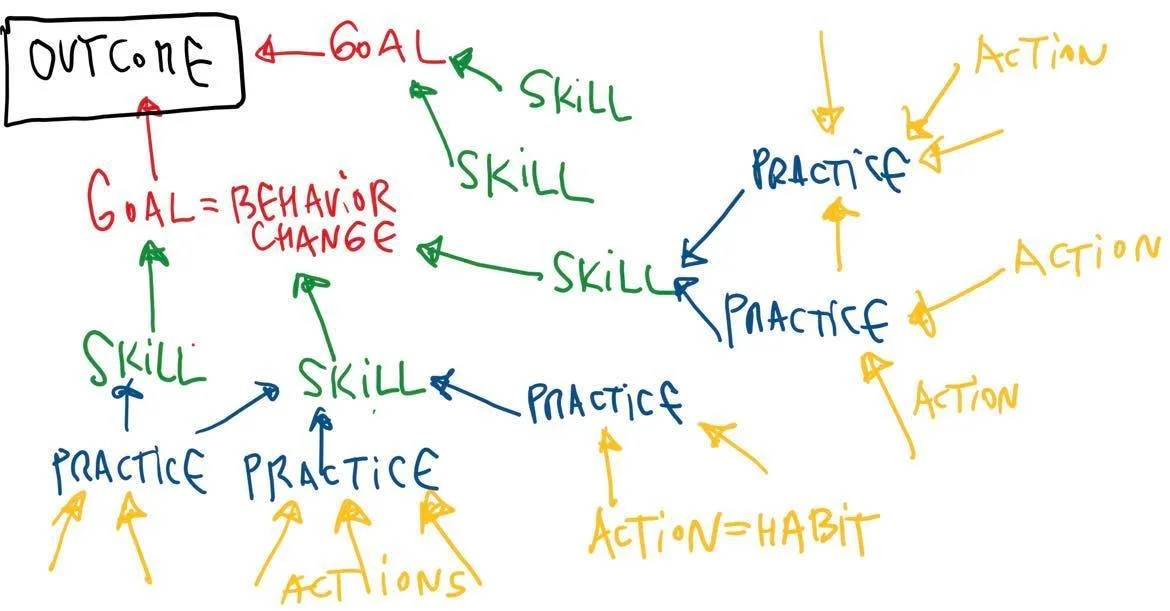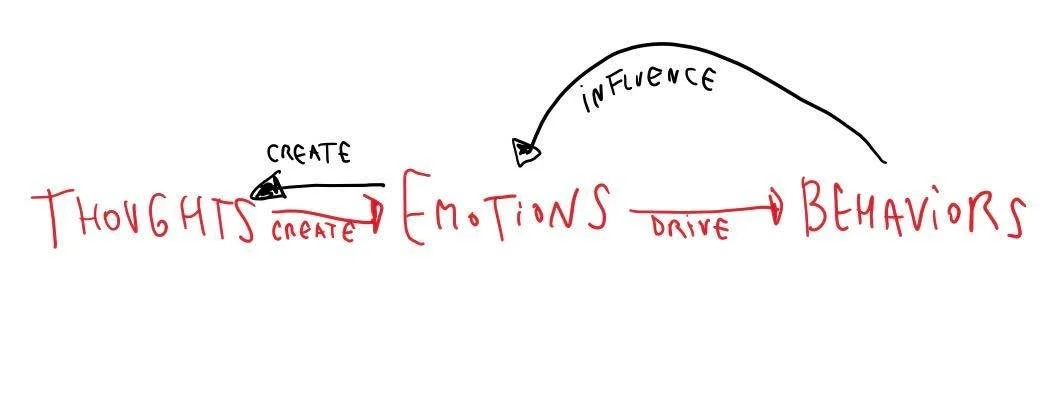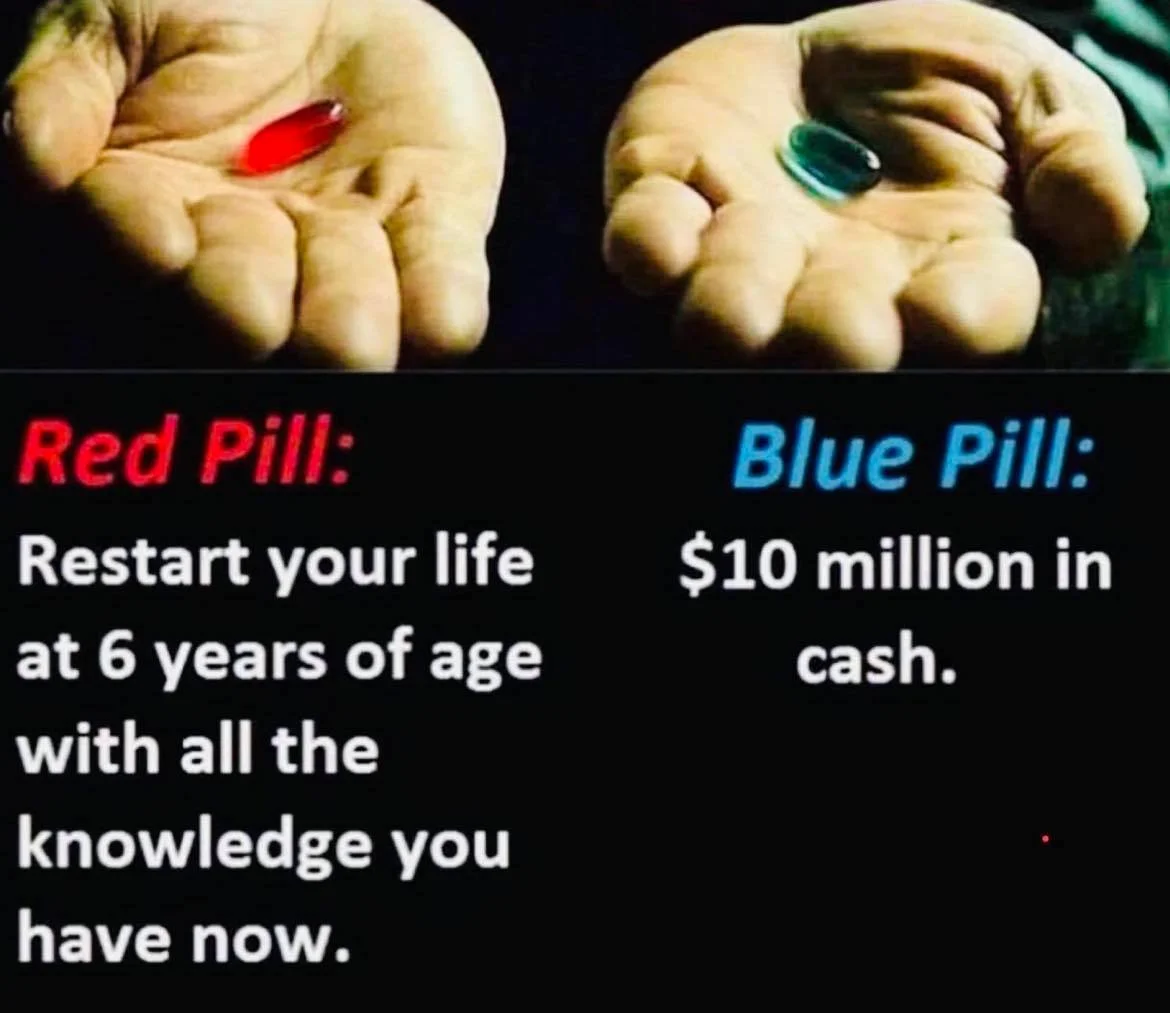WHY CHANGING HABITS IS HARD AND WHAT SHOULD YOU BE AFTER INSTEAD
January is over. So is all the talk about habit changes - working less, being more mindful, eating healthier, working out… Everyone is done with considering their goals, reflecting on the past year, evaluating and predicting the future and have successfully stockpiled a good habit or two. Or not exactly. The ones relying on motivation and inspiration have most probably lost their willpower.
If you want to change, and make an awesome, long-lasting change, start with your MINDSET – about your beliefs, values, and priorities.
Let me share with you the formula:
all OUTCOMES are made of ACTIONs = HABITS
HABIT is a daily ACTION, small, specific, simple, concrete task you do consistently without even giving it a thought – the so called automated behavior (taking a breath and a sip of water between bites). Exercising and applying it creates a PRACTICE (eating slowly and mindfully). Eventually the practices build the ability, competence or give the capacity to develop a SKILL (eating well intuitively). Having the right set of skills will eventually bring you towards your BEHAVIOR GOAL (develop a healthy eating praxis), which bears the highest potential to end-up as a desired OUTCOME (a need, want, feeling) (lose weight). That is why the habit/ action bears such weight and is so powerful - the cornerstone of every behavior goal, and the best option to make it to your OUTCOME goal.
But it does not start with changing the actions and habits. It starts with changing the MODELS in thinking – the mindset. There is where the actions and habits and behaviors are created. OUR MINDSET is OUR FACTORY of our BEHAVIOR.
You can categorize behaviors into 3 types:
1. A WAY TO EXPRESS WHO YOU ARE (your identity), WHAT MATTERS TO YOU (your priorities), WHAT YOU BELIEVE IN (your values) – “being a leader” or “a sport enthusiast”
2. A COPING MECHANISM “overeating to calm down” “screaming to release the tension”
3. A WAY TO SOLVE PROBLEMS
every BEHAVIOR is DRIVEN by EMOTION and interpreted by a THOUGHT
How do you change your identity, values and believes? By changing the way you see things and think about them. And how do you do that? IT ALL STARTS WITH ASKING THE RIGHT QUESTIONS.
Carl Jung: “The right question is already half the solution to a problem.”
Albert Einstein: “If I had an hour to solve a problem…I would spend the first 55 minutes determining the proper questions to ask, for once I know the proper question, I can solve the problem in less than five minutes.”
The right questions are UNFILTERED, DIVING DEEP, bringing out the AWARENESS, UNDERSTANDING, GENERATING NEW CONNECTIONS between information and ideas, CHALLENGING old perspectives and thinking patterns. And the best questions give the INSIGHTS and bring out the AH-HA moments.
No matter where we start and what is the order of questions about ourselves, they all lead to the final truth about oneself, and that is WHAT DO YOU REALLY WANT?
LET US LOOK AT WHAT COULD YOU REALLY WANT?
IN LIFE you have ONLY 3 real assets: MONEY (wealth), TIME and HEALTH. These are your life energies, your life batteries, LIFE CURRENCIES. Everything you do, ALL YOUR LIFE BILLS, is being paid with one of these. With the right choices and right HABITS, you are fueling the tank of each one, but with wrong habits the energy is spent. When the batteries run out, it is a game over – the end. You need to be filling more than you are spending, and you need to work on all three of them.
The problem is we are only familiar with the money currency but are ignorant of time and health currency. But they can be even more valuable as money.
Let’s explore the idea. Let’s say you are 45 years old and have 350.000$ on your saving account. Now let me make this value of money relative for you. Would you be willing to exchange the money you have and the age you are at, to gain 1.000.000$ but for a price of being 60 years old? Or to gain 2.000.000$ and being 80 years old? Would you exchange your time for money? What is the (money) price, value, of your time - 1 year of your life? How valuable is your currency of time in years?
Even more dramatic, would you be willing to exchange your health, “gain” a chronic disease, let us say diabetes or dementia, in an exchange for 10 billion $?
What is the value of your health currency?
The interesting thing is the value of these currencies changes with time. While money has the most value in our mid-ages, it is of little value or even no value when we are newborns as well as when we are 110 years old. On the contrary, time becomes exponentially valuable when it passes by, with age. Health is also a tricky currency, the less you have it more valuable it becomes.
So, every time you are designing something for yourself, ask: WHAT IS THAT GOING TO COST ME in the values of time, health, and money. Or even better: WHAT DO I WANT TO BE EARNING? Sometimes you need to focus on health - mental and spiritual. Doing sports and traveling is fueling your tank of health. Other times it is best to create your career, in order to earn money and gain status. But you should always consider NET GAIN and avoid poor investments, according to and considering your LIFE VALUES. Overall, the more your sum gain is, the better your decision about certain action/ behavior is rated.
Habits are designing a model of how your assets will be spent, which resource is the source and whether is it flowing out or into your health, money or time account. Each habit should either make you healthier, wealthier, OR more time-wise: experienced/ knowledgeable/ of higher status. The older you get, more you should invest your money into fueling your tanks of time and health and designing your habits to support this. Especially health should be your very sacred source, fulling it whenever possible and spending at least.
Bottom line is, always consider all three elements. Most of all be careful with your time and health. As they will become more and more valuable. Design habits to get you more time and health. If you focus only on money, you will be losing either time or health or worst case both.
3 QUESTIONS FOR DESIGNING A HABIT THAT WILL STICK:
1. Make it all about yourself: why are you doing this? what are you earning?
2. Make it meaningful: what would that mean to you?
3. Make it fun: how could this be interesting, exciting, playful?



